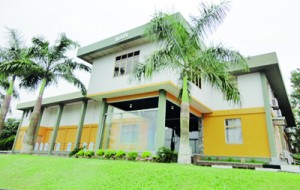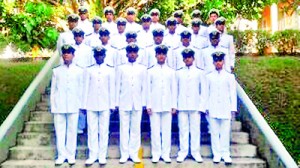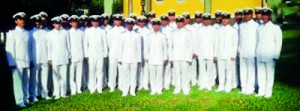CINEC Campus where officers and gentlemen are made
 Commercial Navigation has been one of the oldest business enterprises existing in the world since 6th century B.C and is a significant influence in the current world economy. The goods and resources distributed all over the world, 2/3 of which is covered by water, are imported and exported via commercial navigation. No nation or country can exist isolated in a world, where resources are not equally distributed, and are compelled to resort to imports and exports. Thereby a balance is maintained throughout the world.
Commercial Navigation has been one of the oldest business enterprises existing in the world since 6th century B.C and is a significant influence in the current world economy. The goods and resources distributed all over the world, 2/3 of which is covered by water, are imported and exported via commercial navigation. No nation or country can exist isolated in a world, where resources are not equally distributed, and are compelled to resort to imports and exports. Thereby a balance is maintained throughout the world.
Job opportunities in the Maritime sector are fast increasing and grave problems the shipping companies are facing the relative indifference of the world community for these jobs. According to the data given in BIMCO/ISF.
The main responsibility of a Marine Engineer is the proper operation of all machinery and electrical systems and their maintenance.
There are three fundamental methods of propulsion of a ship,
Main Diesel Engine propulsion.
Electrical Propulsion.
Turbine Propulsion.
More than two million seafarers in this sector, from which 20% are from Philippines. The other leading countries are India and East Europe countries. In relation to the present demand, Asia is a threat to East Europe. The reason for this is that Asia is introducing very efficient and trained officers of high standard, to the international navigation sector. There is a higher demand for them.
At present, Navigation is done mainly by Main Diesel Engine Propulsion. In addition there are other machinery such as Boilers, Purifiers, Pumps, Air Conditioning systems, Control Systems, Fresh Water Generators, Automation Control Systems, All electrical and Electronic Systems and Auxiliary Generator systems.
Marine Engineer should be fully conversant with the functioning and repairing of all these systems. We must realize that Marine Engineer is a profession which covers a wide range of Engineering and Mechanical skills.
The Colombo International Nautical and Engineering Collage (CINEC) is one of the leading institutions which has been producing Marine Engineers and Navigating officers for two decades. By now, the number of Marine Engineers and Navigating officers produce by CINEC is more than 3000. At present Marine Engineering Officer Cadets who pass out from CINEC is 90 to 100 per year and the number of Navigating Officer Cadets is 60 to 75. Today it has gained local and foreign recognition as the foremost Sri Lankan institution which produces well trained, well disciplined and efficient officers to meet the International demand.

CINEC is the only Sri Lankan education institution which has won the prestigious awards International Asia Pacific Quality Award 2010 – Best in Class for Education Organization “, “World Class Global Performance Excellence Award 2012” award and the Prestigious Global Performance Excellence Award – 2012 “ WORLD CLASS – Education Organization”
The basic course for marine engineering, consists of three stages and at the end of the third stage, a Certificate of Competence (COC) class 3 is awarded by the director of Merchant Shipping, Sri Lanka. This certificate is recognized by all the countries and shipping companies in the world. After that, according to professional experience class 2 and class 1 Marine Engineering certificates program can be followed from CINEC.
Local students who have Advance dLevel passes in Science or Maths are recruited to follow the course for Marine Engineering Cadets, after a number of fundamental tests.
The Chairman, Directors, Deans, Lectures and entire staff of CINEC are dedicated to produce well – disciplined and complete Marine Engineers.
Follow @timesonlinelk
comments powered by Disqus
























